Podcast: Play in new window | Download (Duration: 10:02 — 7.0MB) | Embed
Subscribe: Apple Podcasts | Spotify | Amazon Music | Android | Pandora | iHeartRadio | JioSaavn | Podchaser | Gaana | Podcast Index | Email | TuneIn | Deezer | Anghami | RSS | More
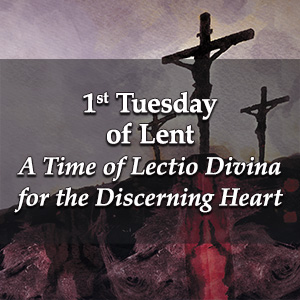 1st Tuesday of Lent – A Time of Lectio Divina for the Discerning Heart Podcast
1st Tuesday of Lent – A Time of Lectio Divina for the Discerning Heart Podcast
As you begin, take a deep breath and exhale slowly. For at least the next few moments, surrender all the cares and concerns of this day to the Lord.
Say slowly from your heart “Jesus, I Trust In You…You Take Over”
Become aware that He is with you, looking upon you with love, wanting to be heard deep within in your heart…
From the Holy Gospel of Matthew 6:7-15
Jesus said to his disciples: ‘In your prayers do not babble as the pagans do, for they think that by using many words they will make themselves heard. Do not be like them; your Father knows what you need before you ask him. So you should pray like this:
‘Our Father in heaven,
may your name be held holy,
your kingdom come,
your will be done,
on earth as in heaven.
Give us today our daily bread.
And forgive us our debts, as we have forgiven those who are in debt to us.
And do not put us to the test,
but save us from the evil one.
‘Yes, if you forgive others their failings, your heavenly Father will forgive you yours; but if you do not forgive others, your Father will not forgive your failings either.’
What word made this passage come alive for you?
What did you sense the Lord saying to you?
Once more give the Lord an opportunity to speak to you:
Jesus said to his disciples: ‘In your prayers do not babble as the pagans do, for they think that by using many words they will make themselves heard. Do not be like them; your Father knows what you need before you ask him. So you should pray like this:
‘Our Father in heaven,
may your name be held holy,
your kingdom come,
your will be done,
on earth as in heaven.
Give us today our daily bread.
And forgive us our debts, as we have forgiven those who are in debt to us.
And do not put us to the test,
but save us from the evil one.
‘Yes, if you forgive others their failings, your heavenly Father will forgive you yours; but if you do not forgive others, your Father will not forgive your failings either.’
What did your heart feel as you listened?
What did you sense the Lord saying to you?
Once more, through Him, with Him and in Him listen to the Word:
Jesus said to his disciples: ‘In your prayers do not babble as the pagans do, for they think that by using many words they will make themselves heard. Do not be like them; your Father knows what you need before you ask him. So you should pray like this:
‘Our Father in heaven,
may your name be held holy,
your kingdom come,
your will be done,
on earth as in heaven.
Give us today our daily bread.
And forgive us our debts, as we have forgiven those who are in debt to us.
And do not put us to the test,
but save us from the evil one.
‘Yes, if you forgive others their failings, your heavenly Father will forgive you yours; but if you do not forgive others, your Father will not forgive your failings either.’
What touched your heart in this time of prayer?
What did your heart feel as you prayed?
What do you hope to carry with you from this time with the Lord?
Our Father, who art in heaven,
hallowed be thy name.
Thy kingdom come.
Thy will be done on earth, as it is in heaven.
Give us this day our daily bread,
and forgive us our trespasses,
as we forgive those who trespass against us,
and lead us not into temptation,
but deliver us from evil.
Amen


 St. John Paul II, notably influenced by Elizabeth, exemplifies her wide-reaching impact, showcasing her role in deepening the spiritual lives of many, including his own. Despite limited access to the full Bible, Elizabeth’s reflections demonstrate a profound scriptural engagement, akin to Lectio Divina, showcasing her deep understanding and integration of scripture into her reflections on prayer and communion with God.
St. John Paul II, notably influenced by Elizabeth, exemplifies her wide-reaching impact, showcasing her role in deepening the spiritual lives of many, including his own. Despite limited access to the full Bible, Elizabeth’s reflections demonstrate a profound scriptural engagement, akin to Lectio Divina, showcasing her deep understanding and integration of scripture into her reflections on prayer and communion with God. In part two of this conversation, Fr. Gallagher and Kris McGregor discuss prayer dryness causes: a lack of formation in prayer, changes in prayer practices, unshared burdens with God, and physical or emotional exhaustion. Fr. Gallagher makes of note the importance of discerning the specific cause of dryness and responding accordingly.
In part two of this conversation, Fr. Gallagher and Kris McGregor discuss prayer dryness causes: a lack of formation in prayer, changes in prayer practices, unshared burdens with God, and physical or emotional exhaustion. Fr. Gallagher makes of note the importance of discerning the specific cause of dryness and responding accordingly.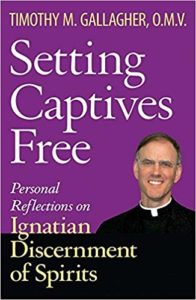
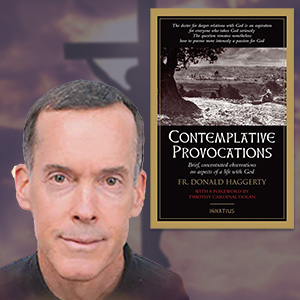
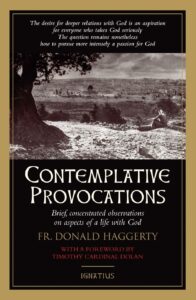
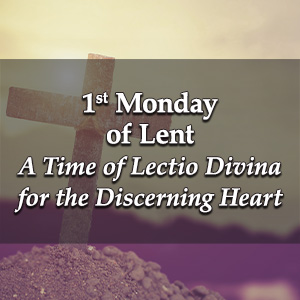 1st Monday of Lent – A Time of Lectio Divina for the Discerning Heart Podcast
1st Monday of Lent – A Time of Lectio Divina for the Discerning Heart Podcast
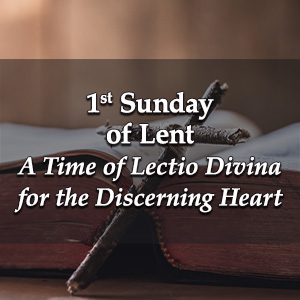 1st Sunday of Lent – A Time of Lectio Divina for the Discerning Heart Podcast
1st Sunday of Lent – A Time of Lectio Divina for the Discerning Heart Podcast Saturday after Ash Wednesday – A Time of Lectio Divina for the Discerning Heart Podcast
Saturday after Ash Wednesday – A Time of Lectio Divina for the Discerning Heart Podcast